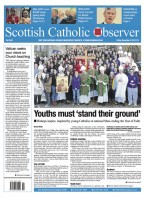November 18 | ![]() 0 COMMENTS
0 COMMENTS ![]() print
print

Science must safeguard human dignity
— Pope Benedict XVI spells out the Church’s position on stem cell research at conference
Pope Benedict XVI has said pursuit of scientific knowledge must never compromise ‘the inviolable dignity of each human being.’
The Holy Father was speaking to participants of an International Conference, sponsored by the Pontifical Council for Culture, whose theme was Adult Stem Cells: Science and the Future of Man and Culture.
In his address (right) last Saturday, the Pope also spoke about the ‘truly remarkable contributions’ science can make to promoting and safeguarding human dignity.
In particular the Pope praised adult stem cell research and called for any ensuing treatments to benefit all who need the care regardless of their financial means.
“Illness is no respecter of persons, and justice demands that every effort be made to place the fruits of scientific research at the disposal of all who stand to benefit from them, irrespective of their means,” the Pope told the 250 delegates present.
Stem-cell research
The Vatican has been a long-standing promoter of adult stem cell research as an alternative to research on embryos and in May 2010, the Holy See signed a deal with US biopharmaceutical company NeoStem that specialises in adult stem cells and the Vatican has already invested $1 million (£634,480) in the company’s work.
“The potential benefits of adult stem cell research are very considerable,” the Holy Father said.
The fact that human embryonic stem cells (ESC) can potentially become any type of cell in the body has long held out the tantalising promise of diseased organs or tissue being repaired or replaced with healthy, lab-grown cells.
The Pope lamented the fact that many scientists prefer to work on embryos.
“When the end in view is one so eminently desirable as the discovery of a cure for degenerative illnesses, it is tempting for scientists and policymakers to brush aside ethical objections,” Pope Benedict said of embryonic stem cell research. “No such ethical problems arise when stem cells are taken from the tissues of an adult organism, from the blood of the umbilical cord at the moment of birth, or from fetuses who have died of natural causes.”
Church’s blessing
The Pope said that those scientists who made the effort to work with adult stem cells had the blessing of the Church.
“I want to assure you of a special remembrance in prayer and I commend to the intercession of Mary, Salus Infirmorum, all of you who work so hard to bring healing and hope to those who suffer,” he said. “I pray that your commitment to adult stem cell research will bring great blessings for the future of man and genuine enrichment to his culture. To you, your families and your collaborators, as well as to all the patients who stand to benefit from your generous expertise and the results of your work, I gladly impart my Apostolic Blessing.”
The Vatican hailed its conference on adult stem cells as dispelling the widespread notion that the Catholic Church is at ‘loggerheads with science,’ said Ignacio Carrasco de Paula, head of the Pontifical Academy for Life.











